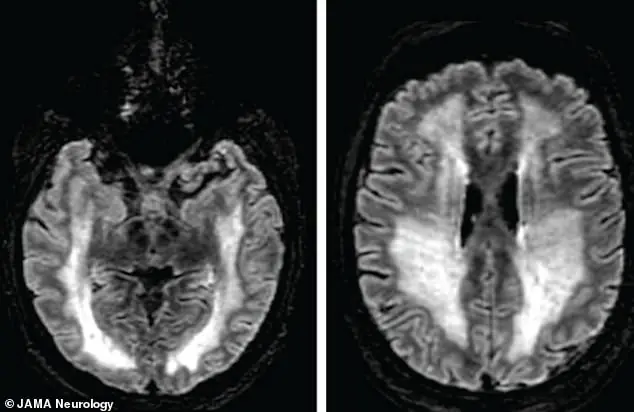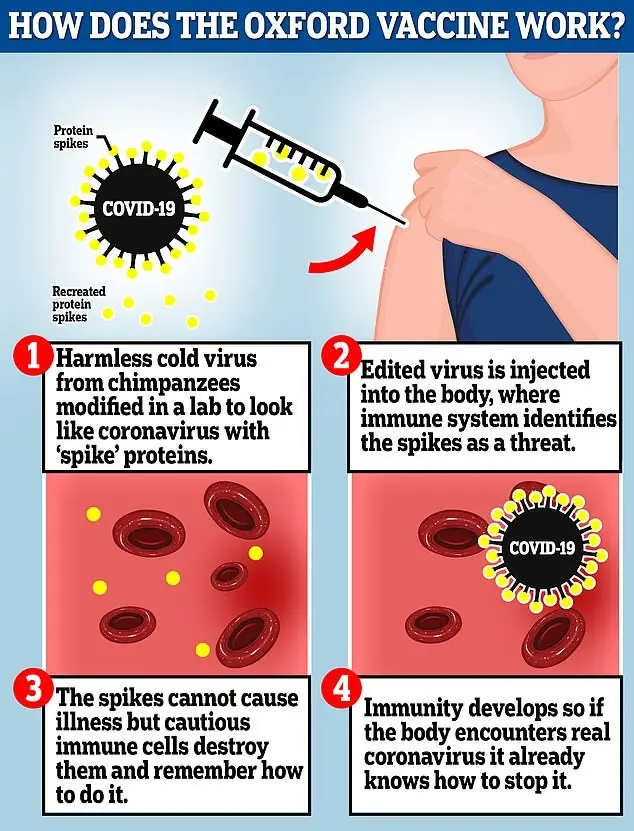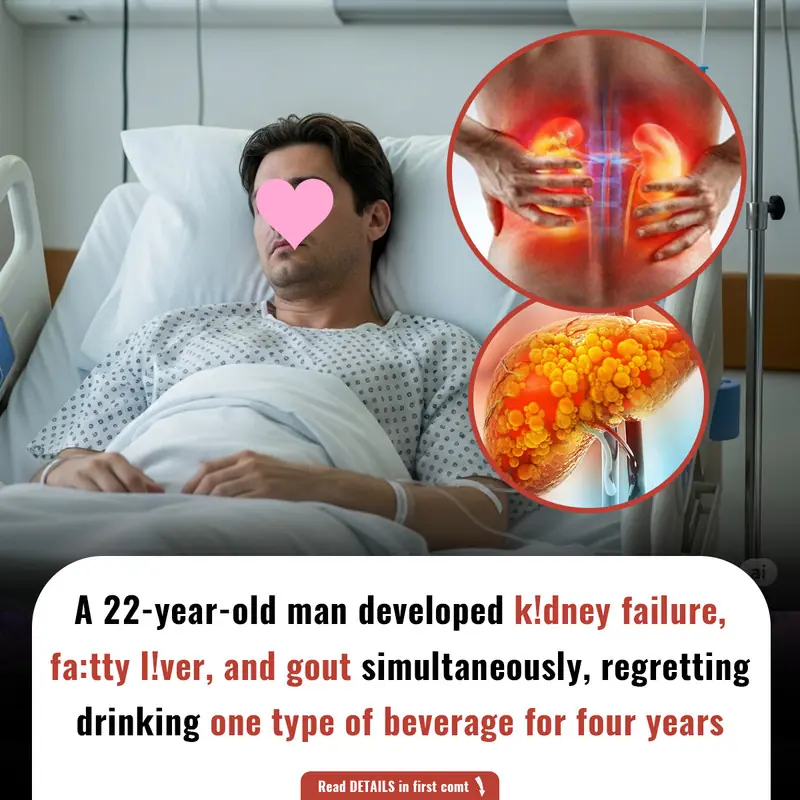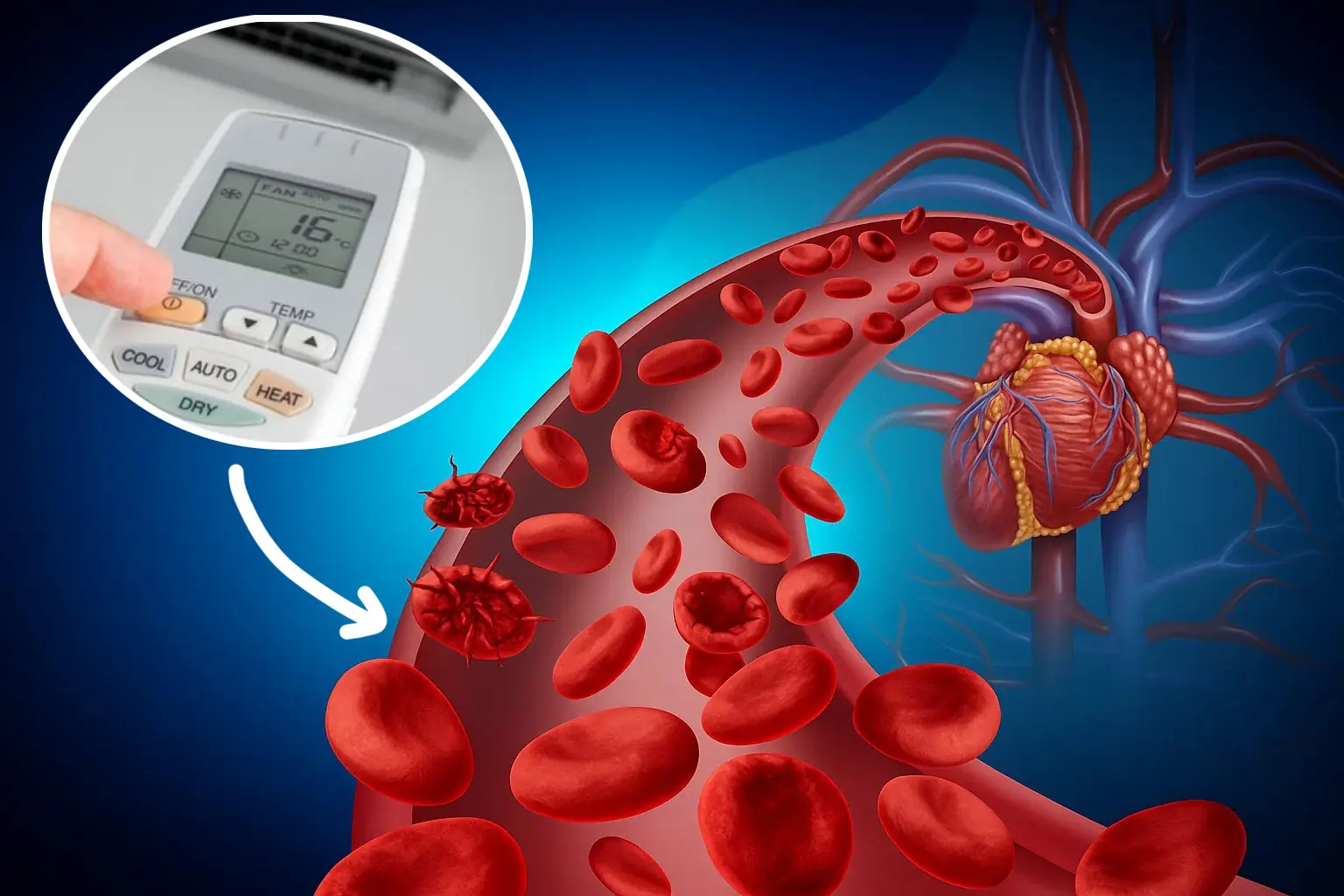
Doctors Warn of Serious Side Effects from Covid Vaccines After Man Develops Brain Inflammation
The Covid-19 vaccine rollout has been one of the greatest achievements in modern medical history, with billions of doses administered worldwide to help combat the global pandemic. However, as with any medical intervention, there are risks, and new concerns have emerged regarding rare but potentially severe side effects associated with certain Covid vaccines. A recent case involving a 60-year-old man from Paris has raised alarm among health experts about a life-threatening side effect: brain inflammation. This condition, diagnosed as post-vaccinal encephalitis, has been linked to the AstraZeneca vaccine and may serve as a warning for others regarding the long-term consequences of Covid-19 vaccinations.
The Case of the 60-Year-Old Man
The case, shared by medical professionals in the medical journal JAMA Neurology, detailed the harrowing experience of a healthy 60-year-old man who developed severe brain and spinal cord inflammation after receiving a dose of the AstraZeneca Covid vaccine. The man sought medical attention after experiencing significant walking difficulties and mental confusion four weeks after the vaccine injection. Initial brain scans revealed he had developed meningoencephalitis, a life-threatening condition that causes swelling of the brain and the tissues surrounding it.

This inflammatory condition, which can be caused by infections, blood cancers, or other health issues, was initially unexplained. However, doctors were unable to find any sign of infections or viruses that could have triggered the condition. After thorough examination, the medical team concluded that the cause of the man’s illness was likely related to an overreaction of his immune system to the AstraZeneca vaccine, leading to a diagnosis of postvaccinal encephalitis.
The condition, although rare, has prompted doctors to raise awareness about the potential risks of vaccinations, especially in individuals who may have underlying health issues or are more vulnerable to autoimmune reactions.
A Closer Look at Postvaccinal Encephalitis
Postvaccinal encephalitis refers to the inflammation of the brain following a vaccination. While vaccines are generally safe and beneficial, there are a few cases where the body’s immune system responds excessively, leading to neurological complications. In the case of the 60-year-old man in Paris, his symptoms worsened over the course of several months. Despite initial treatment, which involved the use of drugs to suppress his immune system, the man experienced a relapse of his symptoms three months after the initial onset.
His symptoms included significant walking difficulties, confusion, and cognitive impairments. Doctors at the time recommended aggressive treatment and close monitoring, which included six months of immune-suppressing medications. Fortunately, after extensive care, the man made an almost full recovery three years later, although he continued to suffer from mild cognitive issues, particularly in his attention span.
The Impact of AstraZeneca's Vaccine and the Role of Genetic Factors
The AstraZeneca vaccine, which was developed in collaboration with the University of Oxford, became one of the most widely used Covid-19 vaccines. However, in early 2021, there were reports of rare side effects, such as thrombosis with thrombocytopenia syndrome (TTS), a combination of blood clots and low platelet levels. This rare but serious complication led to several countries, including the UK, temporarily halting or restricting the use of the vaccine for younger age groups.
While the focus initially was on TTS, experts are now looking into other potential side effects, including encephalitis and other neurological issues. The fact that the man in the French case developed postvaccinal encephalitis suggests that certain individuals may be genetically predisposed to this condition, which could make them more susceptible to such adverse reactions.
According to researchers tasked with looking into the unpleasant reaction, it happens because the modified cold virus that was present in the shot attracts platelet factor 4, a sort of blood protein. The body typically uses platelet factor 4 to encourage blood coagulation in the event of damage. In rare cases, the body's immune system generates antibod:ies to attack platelet factor 4 because it believes it to be a foreign intruder. According to their thinking, these antibod:ies then combine with platelet factor 4 to generate the blood clots that have been so strongly associated with the jab.
Dr. Alison Cave, the Chief Safety Officer for the UK’s Medicines and Healthcare products Regulatory Agency (MHRA), emphasized the importance of genetic testing in identifying individuals who might be at a higher risk for vaccine-related side effects. "Evidence shows that almost a third of side effects to medicines could be prevented with the introduction of genetic testing," she said in a statement. Genetic testing could potentially help doctors identify patients who are at a greater risk of developing complications like encephalitis, enabling them to make more informed decisions about vaccination.
The Growing Concern of Post-Vaccination Syndrome
The case of the French man is not an isolated incident. There is growing concern over what some experts are calling post-vaccination syndrome, particularly related to mRNA vaccines such as Pfizer and Moderna. Some individuals have reported ongoing symptoms like brain fog, dizziness, tinnitus, and exercise intolerance, even long after receiving the vaccine. While these symptoms are often dismissed as temporary, new stud:ies are starting to explore the possibility that they could be part of a larger, more serious issue.
Additionally, recent stud:ies have suggested that post-vaccination syndrome may be linked to the reactivation of dormant viruses, such as Epstein-Barr, which can lead to flu-like symptoms and neurological issues. These findings are still in the early stages and have not been fully peer-reviewed, but they highlight the complexity of the immune response to vaccines and the need for further research into long-term effects.
Global Vaccine Rollout and the Safety Profile of Covid Vaccines
Despite the concerns raised by reports of rare side effects, the overall safety profile of Covid-19 vaccines, including AstraZeneca’s, remains positive. The vaccines have been proven to significantly reduce the risk of severe illness, hospitalization, and d:eath from Covid-19. AstraZeneca’s vaccine, in particular, has been credited with saving millions of lives globally during the pandemic, particularly in low- and middle-income countries.
According to the World Health Organization (WHO), over 11 billion Covid-19 vaccine doses have been administered worldwide, with AstraZeneca being one of the most widely distributed vaccines. However, as with any medication, the vaccines are not without risks. Health officials and medical experts continue to monitor vaccine safety through various reporting systems, such as the MHRA’s Yellow Card Scheme in the UK, which collects reports of adverse events following vaccination.
While the risks of severe side effects are rare, the fact that millions of people have been vaccinated means that even a small percentage of adverse reactions can have significant real-world implications. Health agencies have continued to stress the importance of weighing the benefits of vaccination against the potential risks, and they encourage individuals to discuss any concerns with their healthcare provider.
The AstraZeneca vaccine is a genetically engineered common cold virus that used to infect chimpanzees. It has been modified to make it weak so it does not cause illness in people and loaded up with the gene for the coronavirus spike protein, which Covid-19 uses to invade human cells
Neil Miller, 50, collapsed and d:ied on May 2021, not long after receiving a AstraZeneca Covid- vaccine- his wife Kam has criticised the after-care given to sufferers and their families
Jack Last, 27, d:ied at Addenbrooke's Hospital in Cambridge on April 20 2021 just a few weeks after getting the Oxford AstraZeneca jab
Public Calls for Stricter Vaccine Safety Protocols
The growing number of reports related to neurological complications following vaccination has led some health experts and advocacy groups to call for stricter safety protocols. Some have suggested that the government should introduce a more robust system for tracking and managing post-vaccination side effects, particularly for those who experience severe reactions like encephalitis or other neurological issues.
Dr. Julian Prosia, a Canadian optometrist, commented on the situation: “While make-up in general can lead to more dry eye issues and even irritation on the eye, the waterproof make-up type is the worst thing you can do when it comes to meibomian gland dysfunction.” Similarly, experts are urging that more attention be given to vaccine-induced neurological issues and that genetic screening could help prevent serious reactions.
Conclusion: Weighing the Risks and Benefits
While the safety of Covid-19 vaccines remains a priority for health authorities worldwide, the potential for severe side effects cannot be ignored. The case of the French man and the rise in reports of post-vaccination syndrome highlight the complexity of vaccine-related adverse events. The introduction of genetic testing and closer monitoring of patients who experience side effects could help improve safety and provide a better understanding of the long-term effects of these vaccines.
Ultimately, the benefits of vaccination in preventing severe Covid-19 illness far outweigh the risks for most individuals. However, as the pandemic continues to evolve, it is essential that medical professionals, health authorities, and researchers continue to investigate and address the potential risks associated with vaccination. The goal is to ensure that the vaccines remain safe, effective, and accessible to everyone who needs them.
News in the same category


An unusual abdominal sign warns of severe fa:tty l!ver: If you see it, get checked immediately.
A gastroenterologist has suggested how to recognize fatty liver disease from an unusual sign in the abdomen.

A 33-year-old woman with metastatic canc3r is healthy 3 years later thanks to consistently doing one thing: "If I'd waited longer, things would be different."
Stunned after receiving the health check results, the 33-year-old woman still felt fortunate because she had detected the dangerous disease in time and still had a chance for treatment.

Don't buy these 3 kinds of oysters; even seafood shop owners won't let their families consume them.
If you want to buy good and clean oysters to eat, you must immediately avoid these types.

Straight vs. curved cucumbers: Which tastes better? My mother, with 40 years of farming experience, shares 3 key secrets.
The 'beautiful' things may have deceived you!

Beyond superstition: 5 items placed at your bedside secretly "drain" your health, leaving you more tired the more you sleep.
Green pots, plush bears, and small decorative items are all commonly seen objects in the bedrooms of many families. However, they can completely affect your health.

Is showering 2-3 times a day good in hot weather? Doctors warn certain bathing habits increase stroke risk.
In hot weather, many people have the habit of showering 2-3 times a day to cool down their bodies. However, is this habit good for health?

A 22-year-old man developed k!dney failure, fa:tty l!ver, and gout simultaneously, regretting drinking one type of beverage for four years.
A 22-year-old young man named Wang Yi, from Taiwan (China), went for a check-up and was unexpectedly diagnosed with kidney failure, fatty liver disease, and gout.

Eating too much of these 5 vegetables is like "poisoning" your liver, and the first one is on almost every family's dinner table.
The liver is an important detoxifying organ of the body. However, some familiar vegetables in daily meals can become silent 'enemies,' harming the liver if not used properly.

Woman suffers severe consequences after using bee stings to treat breast canc3r
Having breast cancer but not going to the hospital for treatment, instead opting for honeybee stings at home, the woman in Ho Chi Minh City has to bear the heavy consequences as the tumor complicates and metastasizes to many places.

Everyone knows canc3r can be hereditary, but which types of cancer have a higher risk?
Some hereditary cancers related to genetic mutations, such as breast cancer, ovarian cancer, and prostate cancer, can be managed and screened early thanks to genetic counseling.

Prolonged "minor ailments" could indicate canc3r, so beware of these 7 signs.
If you continuously experience headaches, loss of appetite, dry cough, and continuous weight loss... you need to see a doctor immediately as this could be a sign of cancer.

8 types of fruit that contain a lot of sugar should be limited to reduce the risk of diabetes and protect health
Fruit is good for you, but certain kinds contain a lot of sugar. Overeating can impact your health by raising blood sugar levels.

Hidden St0mach Canc3r Risk: How H. Pylori Infection Can Lead to Silent Canc3r and What You Need to Know
Learn about the link between Helicobacter pylori infection and stomach canc3r. Discover how this common food and waterborne bacteria could lead to silent canc3r and how early detection and treatment can help prevent it.

5 Simple Habits to Slash Heart Att@ck and Stroke Risks - Experts Reveal the Secrets
Discover 5 easy daily habits that can significantly reduce the risk of heart attack and stroke. From exercise to diet, learn how small lifestyle changes can protect your heart and improve overall health.

4 Visible Signs of Fatty Liver Dise@se on Your Face and How to Recognize Them
Discover the 4 common facial signs of fatty liver disease (NAFLD) like puffiness, skin discoloration, and acne. Learn how liver health affects your skin and when to seek medical help.

Vitamin D Can Reduce Tooth Decay by 50%, Study Finds: A Natural Solution to Dental Health
Discover how vitamin D can reduce tooth decay by 50%. Learn about its role in preventing dental caries, the link between vitamin D and oral health, and more in this detailed guide.

3 habits that "destroy blood vessels" faster than eating fatty meat: Many people still do them carelessly every summer
There are other causes of "damaging blood vessels" besides eating a lot of fatty meat and fatty foods. Three frequent summertime activities can also damage blood vessels, according to physicians.

Top 3 Seeds and 3 Drinks to Reduce Bloating, According to a Renowned Gastroenterologist
Discover the top seeds and drinks recommended by Dr. Saurabh Sethi to reduce bloating. Learn about sesame, flax, chia seeds, and drinks like ginger tea, kefir, and more.

There's a secret on b33r bottle caps: Target this point to open them easily by hand.
Many people have used their teeth, the edge of a table, or the armrest of a chair to open beer bottle caps – both dangerous and likely to cause damage. In fact, there is a special 'weak point' on beer bottle caps. Just aim correctly at this spot, and yo
News Post

When washing dishes, follow this method to remove all chemicals: Don't rush and risk "eating" detergent.

An unusual abdominal sign warns of severe fa:tty l!ver: If you see it, get checked immediately.
A gastroenterologist has suggested how to recognize fatty liver disease from an unusual sign in the abdomen.

A 33-year-old woman with metastatic canc3r is healthy 3 years later thanks to consistently doing one thing: "If I'd waited longer, things would be different."
Stunned after receiving the health check results, the 33-year-old woman still felt fortunate because she had detected the dangerous disease in time and still had a chance for treatment.

Don't buy these 3 kinds of oysters; even seafood shop owners won't let their families consume them.
If you want to buy good and clean oysters to eat, you must immediately avoid these types.

Straight vs. curved cucumbers: Which tastes better? My mother, with 40 years of farming experience, shares 3 key secrets.
The 'beautiful' things may have deceived you!

Beyond superstition: 5 items placed at your bedside secretly "drain" your health, leaving you more tired the more you sleep.
Green pots, plush bears, and small decorative items are all commonly seen objects in the bedrooms of many families. However, they can completely affect your health.

Is showering 2-3 times a day good in hot weather? Doctors warn certain bathing habits increase stroke risk.
In hot weather, many people have the habit of showering 2-3 times a day to cool down their bodies. However, is this habit good for health?

A 22-year-old man developed k!dney failure, fa:tty l!ver, and gout simultaneously, regretting drinking one type of beverage for four years.
A 22-year-old young man named Wang Yi, from Taiwan (China), went for a check-up and was unexpectedly diagnosed with kidney failure, fatty liver disease, and gout.

2-Step Korean-Inspired Glowup Routine: Achieve Radiant, Youthful Glass Skin At Home
The combination of rice, flaxseed, and other nourishing ingredients offers numerous benefits, from boosting hydration to fighting free radicals and improving skin texture. Follow this routine consistently, and you’ll be on your way to achieving the cove

Eating too much of these 5 vegetables is like "poisoning" your liver, and the first one is on almost every family's dinner table.
The liver is an important detoxifying organ of the body. However, some familiar vegetables in daily meals can become silent 'enemies,' harming the liver if not used properly.

The Legacy of Ruby Middleton Forsythe: A Lifelong Advocate for Education and Civil Rights
Discover the inspiring life of Ruby Middleton Forsythe, a dedicated educator who shaped the future of African-American children in South Carolina, teaching for over six decades despite adversity.

A 14-Year-Old’s Work Ethic: How One Young Girl’s Determination is Shaping Her Future
Discover the inspiring story of a 14-year-old girl who took the initiative to get a job, worked hard, and is saving for her future. Learn how determination and responsibility are shaping her dream to become a doctor.

Woman suffers severe consequences after using bee stings to treat breast canc3r
Having breast cancer but not going to the hospital for treatment, instead opting for honeybee stings at home, the woman in Ho Chi Minh City has to bear the heavy consequences as the tumor complicates and metastasizes to many places.

Mid-Flight Miracle: How a WestJet Flight Attendant Became a Baby-Whispering Hero
A family's challenging flight with a crying 4-month-old was transformed by the extraordinary kindness of a WestJet flight attendant. Discover this heartwarming story of empathy and going above and beyond in customer service.

Quiet Strength and Southern Grace: The Unseen Heroism of a Mother-in-Law Named Sharon
Discover the powerful story of Sharon, a mother-in-law whose quiet resilience and unwavering love carried her family through cancer, caregiving, and grace under pressure.

The Wisdom of Experience: How a $10 Withdrawal Taught a Bank Teller a Priceless Lesson
An elderly customer's request for a $10 withdrawal led to a viral moment of hidden wisdom. This compelling story reveals how patience and respect for elders can transform interactions, offering a powerful lesson in customer service and human dignity.

DIY Flaxseed Gel & Okra Hair Gel for Natural Hair Growth and Frizz-Free Shine
By incorporating these DIY treatments into your routine, you can achieve healthier, shinier, and fuller hair—without relying on harsh chemicals or expensive products.

Everyone knows canc3r can be hereditary, but which types of cancer have a higher risk?
Some hereditary cancers related to genetic mutations, such as breast cancer, ovarian cancer, and prostate cancer, can be managed and screened early thanks to genetic counseling.

Katherine Swynford: From Mistress to Duchess and the Legacy of Love and Power
Discover the extraordinary life of Katherine Swynford, from a lady-in-waiting to a duchess, her deep love story with John of Gaunt, and the lasting impact of her children, the Beauforts, on English history.

Prolonged "minor ailments" could indicate canc3r, so beware of these 7 signs.
If you continuously experience headaches, loss of appetite, dry cough, and continuous weight loss... you need to see a doctor immediately as this could be a sign of cancer.